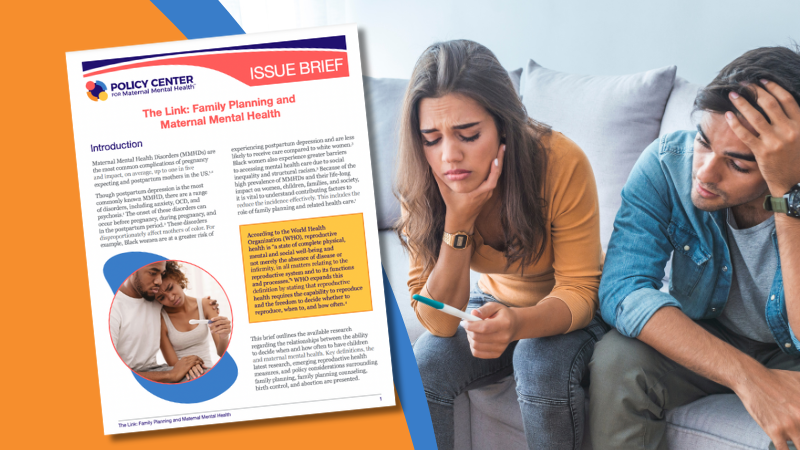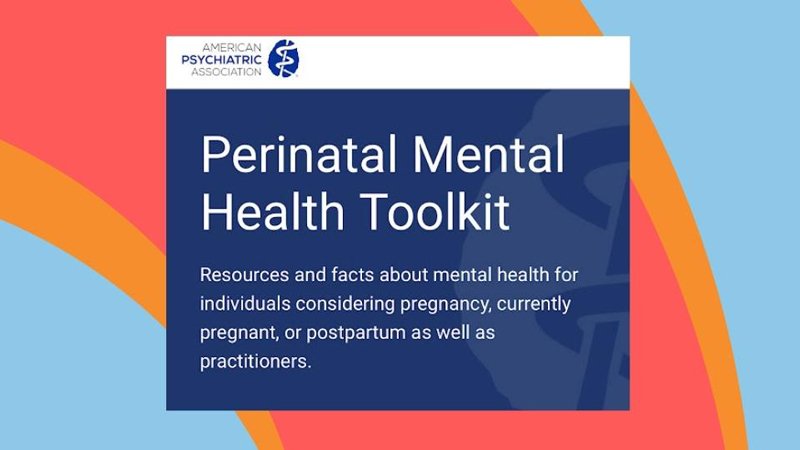Our work shaping and reporting on national mental health policy is made possible through a 2023-2024 capacity grant from a philanthropic donor.
On March 13, the Policy Center team submitted the following letter to the National Committee for Quality Assurance (NCQA). The letter was submitted in response to the HEDIS public comment period.
March 13, 2024
To the National Committee for Quality Assurance (NCQA):
The undersigned organizations, representing the perinatal population of nearly 4 million and the providers who serve them, are writing in response to the 2024 HEDIS public comment period.
As champions of maternal mental health screening, we strongly recommend that the NCQA:
- Add “Anxiety Screening” to the Prenatal Depression Screening and Follow-Up (PND-E) measure and the Postpartum Depression Screening and Follow-Up (PDS-E) measure,
- Make reporting of the HEDIS® PND-E and the PDS-E measures mandatory
- Modify Electronic Clinical Data Systems (ECDS) specifications to exclude the inclusion of screening by insurer/health plan staff
Recommendation #1: Add anxiety screening to the PND-E and PDS-E measures.
Studies now illustrate anxiety is common in the perinatal period and may be a precursor to depression, indicating that screening should occur for both depression and anxiety.1 Screening for anxiety supports early diagnosis and treatment of depression. Further, it is well documented that stress, anxiety, and depression in pregnancy are linked to both poor maternal and fetal health outcomes.2,3
The American College of Obstetricians and Gynecologists has long recognized the importance of screening for both depression and anxiety among perinatal patients (Committee Opinion 757).4 In June 2023, the United States Preventive Services Task Force (USPSTF) recommended screening for anxiety disorders in adults, including those who are pregnant and postpartum.5
Also, in 2023, the federal Health Resources and Services Administration’s (HRSA) Alliance for Innovation in Maternal Health (AIM) republished the Perinatal Mental Health “Bundle” as a primary bundle, which recommends screening for anxiety.6
The EPDS (Edinburgh Postpartum Depression Scale) screener is recognized as valid for detecting both depression and anxiety and other screeners, such as the GAD (Generalized Anxiety Disorder) and PASS (Perinatal Anxiety Screening Scale), may also be used to detect perinatal anxiety. Credit could be given if screening for both depression and anxiety occurred. All relevant professional associations recognize the importance of screening for anxiety in the perinatal population. As such, the undersigned strongly recommends anxiety screening be added to the PND-E and PDS-E measures.
Recommendation #2: Require Mandatory Reporting of the PND-E and PDS-E Measures
Developed in 2019, the PND-E and PDS-E measures are not yet mandatory for insurers to report to maintain/attain NCQA accreditation. Among the insurers that reported measures in 2023, the majority reported the PND-E and PDS-E voluntarily: among the 382 private plans that reported, 90% (343 plans) voluntarily reported the measures; among the 224 Medicaid plans that reported, 68% (153 plans) voluntarily reported the measures.7
There are several compelling reasons to make these measures mandatory for all NCQA-accredited insurers:
First, although numerous insurers voluntarily report the PND-E and PDS-E measures, these insurers’ screening rates are extremely low. The 2023 PND-E and PDS-E screening rates reported by insurers were at less than 10% for Medicaid enrollees and less than 4% for privately insured enrollees.8 It is suspected that screening rates are this low because these organizations are making little effort to prioritize data collection, given the voluntary reporting status. If reporting were mandatory, insurers would be compelled to put sufficient resources into data collection and would prioritize quality improvement interventions to increase screening rates.
Second, the measures meet the criteria for NCQA mandatory reporting. NCQA notes in the HEDIS rating methodology that measures are made mandatory for accreditation when a measure has “good differentiating properties, up-to-date evidence, and high population impact.”9 The PND-E and PDS-E measures fit these criteria:
- Good differentiating properties: The PND-E and PDS-E are the first of their kind to capture rates of maternal mental health screening and follow-up.
- Up-to-date evidence: The evidence is clear – mental health disorders are the leading cause of maternal mortality in the US.10 For nearly a decade, maternal depression screening has been recommended in clinical guidelines created by expert entities such as the American College of OB-GYNs (ACOG) and the US Preventive Services Task Force (USPSTF). Yet, research has shown that screening is not occurring: research estimates that 50-70% of maternal mental health disorders go undiagnosed, and 75% of those diagnosed go untreated.11,12
- High population impact: There are approximately 4 million women who become pregnant in the U.S. every year. Requiring insurers to measure/report maternal mental health screening will have a significant impact on the health and well-being of the U.S. perinatal population and their children.
Therefore, we strongly urge NCQA to move these measures to mandatory status so insurers are incentivized to prioritize screening and follow-up given the maternal mortality crisis in America, the mental health crisis, and because undetected and untreated maternal mental health disorders also impact infants and children.
Recommendation 3: Modify e-measure (ECDS) specifications to exclude the inclusion of screening by insurer/health plan staff.
Finally, we urge NCQA to consider modifying the specifics of Electronic Clinical Data Systems (ECDS) measures, which include PND-E and PDS-E. We believe that HEDIS should only measure whether the patient’s provider is screening; we don’t believe health insurers should perform this critical function (just as they don’t for other diagnostic tests). However, follow-up could be provided by health insurer case managers to ensure that the patient accessed in-network care and received any other interventions and treatments the treating provider and patient agreed to add to any treatment plans.
Thank you for your consideration of these requests. Should you have any questions about this request, please don’t hesitate to contact [email protected] and [email protected].
Sincerely,
Professional Associations, National Non-Profit Organizations and Universities
-Policy Center for Maternal Mental Health
-American Foundation for Suicide Prevention
-American Mental Health Counselors Association
-American Psychological Association Services
-Association of Maternal and Child Health Programs
-Cummings Graduate Institute
-Georgetown University Center for Children and Families
-HealthyWomen
-Inseparable
-Kennedy Forum
-Lifeline for Families Center and Lifeline for Moms Program at UMass Chan Medical School
References
- Nakić Radoš, S., Tadinac, M., & Herman, R. (2018). Anxiety During Pregnancy and Postpartum: Course, Predictors and Comorbidity with Postpartum Depression. Actaclinica Croatica, 57(1), 39–51. https://doi.org/10.20471/ acc.2017.56.04.05
- Araji, S., Griffin, A., Dixon, L., Spencer, S.-K., Peavie, C., & Wallace, K. (2020, November 30). An overview of maternal anxiety during pregnancy and the post-partum period. Retrieved from https://www.mentalhealthjournal.org/articles/ an-overview-of-maternal-anxiety-during-pregnancy-and-the- post-partum-period.html
- Dunkel Schetter, C., & Tanner, L. (2012). Anxiety, depression and stress in pregnancy: implications for mothers, children, research, and practice. Current opinion in psychiatry, 25(2), 141–148. https://doi.org/10.1097/YCO.0b013e3283503680
- Implementing Perinatal Mental Health Screening – ACOG Accessed at https://www.acog.org/programs/perinatal-mental-health/implementing-perinatal-mental-health-screening#:~:text=ALL%20perinatal%20women%20should%20be,should%20be%20done%20again%20postpartum.
- The US Preventive Services Task Force. [Internet]. Rockville (MD). [cited 2024 Jan 4] Final Recommendation Statement: Screening for Anxiety Disorders in Adults. Accessed: https://www.uspreventiveservicestaskforce.org/uspstf/announcements/final-recommendation-statement-screening-anxiety-disorders-adults
- https://saferbirth.org/psbs/perinatal-mental-health-conditions/
- The source for health plan measure rates and benchmark data is Quality Compass® 2023 and is used with the permission of the National Committee for Quality Assurance (“NCQA”). Any analysis, interpretation or conclusion based on the Data is solely that of the authors, and NCQA specifically disclaims responsibility for any such analysis, interpretation or conclusion.
- Ibid.
- NCQA. (2024). 2024 Health Plans Methodology. Accessed at: https://www.ncqa.org/wp-content/uploads/2024-HPR-Methodology_Updated-December-2023.pdf
- Trost SL, Beauregard J, Njie F, et al. (2022). Pregnancy-Related Deaths: Data from Maternal Mortality Review Committees in 36 US States, 2017-2019. Centers for Disease Control and Prevention, US Department of Health and Human Services. Accessed July 30, 2023: https://www.cdc.gov/reproductivehealth/maternal-mortality/erase-mm/data-mmrc.html?source=email
- Osterman MJK, Hamilton BE, Martin JA, Driscoll AK, Valenzuela CP. Births: Final Data for 2021. Natl Vital Stat Rep. 2023 Jan;72(1):1-53.
- Cox EQ, Sowa NA, Meltzer-Brody SE, Gaynes BN. The Perinatal Depression Treatment Cascade: Baby Steps Toward Improving Outcomes. J Clin Psychiatry. 2016 Sep;77(9):1189-1200.



